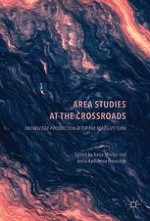2017 | OriginalPaper | Buchkapitel
Positionality and the Relational Production of Place in the Context of Student Migration to Gilgit, Pakistan
verfasst von : Andreas Benz
Erschienen in: Area Studies at the Crossroads
Verlag: Palgrave Macmillan US
Aktivieren Sie unsere intelligente Suche, um passende Fachinhalte oder Patente zu finden.
Wählen Sie Textabschnitte aus um mit Künstlicher Intelligenz passenden Patente zu finden. powered by
Markieren Sie Textabschnitte, um KI-gestützt weitere passende Inhalte zu finden. powered by
